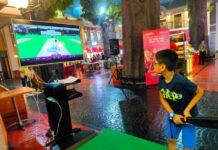Worldreader releases results from the Read to Kids pilot in India, showing the potential of mobile phones to get entire communities reading to children
New Delhi, June 29, 2018: Worldreader, the global nonprofit that believes everyone can be a reader, in partnership with Pearson, as part of theProject Literacy campaign,and Results for Development, today released the results of a two-year digital reading pilot which revealed how parents’ and caregivers’ reading habits changed after receiving access to a free mobile library of children’s books alongside community-based education about the benefits of reading to children from a young age. The report contributes to growing evidence on how parents can support their children’s early learning using technology.
The pilot took place in Delhi, India from 2015 to 2017 and reached over 200,000 families with digital books via the Worldreader Kids app (www.readtokids.com). The first digitally focused literacy intervention of this kind, Read to Kids leveraged a behavior change campaign and partnered with community-based organizations to raise awareness on the importance of reading to children from birth. While the majority of children that the pilot targeted lived in homes lacking age-appropriate children’s storybooks, over 57,000 families browsed the Worldreader Kids library and read at least one book. Nearly 7,000 households demonstrated deeper change in their reading habits, becoming “frequent readers” who read from the application at least four times a month.
Other findings include:
- Digital reading is scalable and affordable. App promotion and downloads cost Worldreader approximately $0.30 USD per user. This low cost of app promotion coupled with widespread availability of mobile phones in India supports affordable access to Worldreader’s digital books. India’s aggressive cell phone market translates to low data costs for the end user making online digital reading an affordable option, even for low-income parents. Reading a book a day for thirty days cost the equivalent of two cups of street chai, or about $0.16 USD per month.
- Women became important and indirect beneficiaries of the pilot. Many women in the intervention group report that access to storybooks and participation in the program has increased their access to a family mobile phone, led to more investment in cellular data and improved their digital literacy.
- Local language books are preferred. Parents prefer books in mother tongue (Hindi) but English is also frequently read and reflects parental aspirations for early exposure to English. 60% of the books opened on the app were in Hindi or bilingual and 40% were English.
- In person, digital and media assets together best foster attitude and behavior change in parents. A blend of digital and in-person strategies is most supportive in normalizing digital reading to children.
“Our goal was to take the ubiquitous mobile phone in India, transform it into a great mobile library, and discover how to get parents reading with their children,” said Wendy Smith, Director of Pre-Reading Programs, Worldreader. “This report is additional proof to ways parents can support their children’s early learning using technology, and showcases the power of mobile reading for improving early-childhood learning outcomes.”
“Research shows that the more words children hear at home, the more prepared they’ll be when they enter school. We are proud to take part in the rich experimentation that is happening in this space to ensure we are setting the next generation up for success,” said Jennifer Young, Director of Social Impact Programs at Pearson. “Our hope is that others working to end illiteracy can pick up on what we’re doing and start researching and experimenting on their own, leveraging the technology already available to many people around the world.”
The Worldreader Kids app was designed, developed and launched containing an age appropriate digital collection of 550 children’s storybooks in Hindi and English. The books were sourced from 34 different local and international publishers including Pearson, Katha, Tulika, Pratham Books and Eklavya.
Worldreader also partnered with organizations like CKS, HLFPPT, SARD, KATHA as well as Happy McGarry Bowen and ITTISA, to co-design the behavior change campaign and support the digital and traditional mass media strategy. These partners have an established presence and positive influence in 177 low-income communities across Delhi and were selected based on their extensive networks, their ability to scale, and their knowledge of early childhood development, reading or early education. All partners promoted reading and aimed to improve the knowledge, attitudes and reading behaviors of parents and caregivers in the target group.
The pilot generated evidence through an adaptive learning approach, designed by Results for Development that combined real-time data with project implementation to yield results on what was working and what was not. An independent impact evaluation carried out by the Center of Early Childhood Education and Development (CECED) from Ambedkar University, Delhi was also carried out.
“The recent All India National Achievement Survey showed that at Grade 3 levels,16.5% of children are failing (score less than 30%) and 24.5% of children are below 50% score mark in languages in Delhi state and the situation in rest of the nation is not any better,” said Vikas Singh, Managing Director of Pearson India. “There is an urgent need for language interventions in pre and primary grades across the nation. Interventions such as Worldreader’s Read to Kids which have the potential to empower parents and our youngest generations to become better prepared for school and life in general must be scaled fast.”
“Parent involvement in early childhood education and positive parental aspirations are increasing across socio-economic levels in India,” said BhanuPotta, global executive member and India Board Director, Worldreader. “The Read to Kids pilot in India is an innovative program that is leveraging children’s storybooks from local and international publishers and the increased penetration of affordable smartphones and mobile internet, to make it even easier for parents and caregivers in low-income households to read to their young children and help in their lifelong learning process.”
“Mobile phones are everywhere, and early childhood reading has the greatest impact in a person’s life,” said David Risher, co-founder and CEO, Worldreader. “Read to Kids pilot in India lays the groundwork to unlock the potential of millions of children around the world.”
To read the full Read to Kids report, visit: http://bit.ly/R2KFinalreport.
Corporate Comm India(CCI Newswire)






























